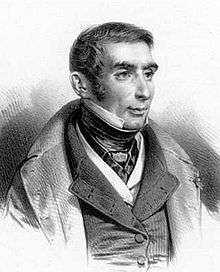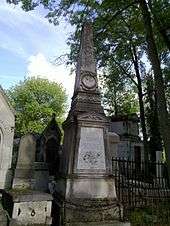Eugène Scribe
Augustin Eugène Scribe (French: [oɡystɛ̃ øʒɛn skʁib]; 24 December 1791 – 20 February 1861) was a French dramatist and librettist. He is known for the perfection of the so-called "well-made play" (pièce bien faite), a mainstay of popular theatre for over 100 years, and as the librettist of many of the most successful grand operas.

Biography
Scribe was born in Paris and died there. His father was a silk merchant, and he was well educated, being destined for the law. However, he soon began to write for the stage. His first piece, Le Prétendu sans le savoir, was produced anonymously at the Théâtre des Variétés in 1810 and was a failure. Numerous other plays, written in collaboration with various authors, followed; but Scribe achieved no distinct success till 1815, when he wrote Une Nuit de la garde nationale (Night of the National Guard, 1815), a collaboration with Delestre Poirson. Much of his later work was also written in collaboration with others. His debut in serious comedy was made at the Théâtre Français in 1822 with Valérie, the first of many successful pieces of the same kind.[1] Among the actors he wrote starring roles for are Mlle Mars and Rachel. Scribe was elected to the Académie Française in 1834.

Scribe's main subject matter was the contemporary bourgeoisie. He mastered his craft writing comédies vaudevilles, short middle-class entertainments, often with songs. Eventually he developed the formulaic "well-made play"; popular pieces with elaborate plots featuring clever twists and turns, and usually centering on a misunderstanding (quiproquo) which is revealed early on to the audience but not realised by the protagonists until the final scenes. Characters face a series of obstacles, the resolution of which may create in turn further problems. At the end a scène a faire, with startling revelations, leads to a sensational denouement.[2][3] Whilst their ingenuity was recognised by contemporary and later critics, the plays lack fine language, depth of character, thought, or social analysis. They thus stand in sharp contrast, for example, to Romantic plays of the same period, such as those of Victor Hugo. Théophile Gautier questioned how it could be that, "an author without poetry, lyricism, style, philosophy, truth or naturalism could be the most successful writer of his epoch, despite the opposition of literature and the critics?"[4]
Scribe was prolific; he wrote various dramas — vaudevilles, comedies, tragedies and opera libretti. To the Théâtre du Gymnase alone he is said to have furnished a hundred and fifty pieces before 1830. He had a number of co-workers, (Scribe's 'factory'), one of whom supplied the story, another the dialogue, a third the jokes and so on. He is said in some cases to have sent sums of money for "copyright in ideas" to men who were unaware that he had taken suggestions from their work. Among his collaborators were Jean Henri Dupin (1787–1887), Germain Delavigne, Delestre-Poirson, Mélesville, Marc-Antoine Madeleine Désaugiers, Xavier Saintine and Ernest Legouvé.[1]

The mechanical aspect of Scribe's constructions made his works suitable for operatic adaptation, allowing for "effective contrasting of musical treatment, whilst the confrontations provided excellent opportunities for ensembles."[5]
Scribe wrote libretti for operas for many major composers of his time, often for productions destined for the Paris Opéra. Many of these libretti constitute the basis of the Grand Opera genre and changed the whole course of French lyric drama.[6]
He collaborated with Giacomo Meyerbeer on a number of occasions, and also provided the words for works by Giuseppe Verdi (Les vêpres siciliennes), Vincenzo Bellini, Daniel Auber (La muette de Portici, Gustave III and others), Fromental Halévy (including La Juive, Guido et Ginevra, and Le Juif errant), François-Adrien Boieldieu, Gaetano Donizetti (Dom Sébastien) and Gioachino Rossini (Le comte Ory). At the time of his death, he was working on a revision of the libretto for Meyerbeer's L'Africaine, which he had originally written in 1838.[5]
Of his 'historical' operas it has been written:
They exist in a parallel universe, in which colourful historical or geographical milieu display a handful of stereotypes who, as a consequence of some secret manoeuvrings in their own pasts and coincidences in the present, are forced to face some implausible crisis of choice or conscience, preferably accompanied by a simultaneous natural disaster or violent death (or both).[7]
Scribe's own hard-headed views on his libretti are summarised in his comments on a dispute over payment with Léon Pillet, the director of the Opéra, in 1841:
I want to be paid for them according to what they bring in, that is to say, a great deal. The...director only wants to pay for them according to what they are worth, that is to say, very little.[8]
Scribe wrote a few novels, but none of any mark. His Œuvres complètes appeared in seventy-six volumes between 1874 and 1885.[1]
He has been assumed to be the father of the politician Georges Coulon.[9]
Works
See also Category: Libretti by Eugène Scribe and Category:Plays by Eugène Scribe
Plays

- 1826: Bertrand et Suzette; ou Le Mariage de raison
- 1833: Bertrand et Raton, ou l'art de conspirer (The School for Politicians)
- 1842: Une Chaine
- 1842: Le Verre d'eau (The Glass of Water)
- 1849: Adrienne Lecouvreur, in conjunction with Legouvé
- 1851: La Bataille de Dames (The Ladies' Battle)
Plays adapted into opera libretti
- 1831: A ballet-pantomime became the basis of the Italian libretto for Bellini's La sonnambula
- 1832: Le philtre was adapted by Felice Romani into the libretto for Donizetti's L'elisir d'amore
- 1902: Adriana Lecouvreur (written in collaboration with Ernest Legouvé) was adapted into a libretto by Arturo Colautti for Francesco Cilea's Adriana Lecouvreur
Principal libretti
- 1825: Boieldieu's La dame blanche (based on five works by Walter Scott)
- 1828: Revisions to a libretto by Germain Delavigne for Auber's La muette de Portici (The Mute Girl of Portici)
- 1828: Rossini's Le comte Ory
- 1830: Auber's Fra Diavolo
- 1831: Meyerbeer's Robert le diable (with Germain Delavigne)
- 1831: La marquise de Brinvilliers set by nine composers (with Castil-Blaze)
- 1831: Meyerbeer's Les Huguenots (with Émile Deschamps)
- 1833: Auber's Gustave III, ou Le bal masqué (Gustavus III, or The Masked Ball) (model for Verdi's Un ballo in maschera)
- 1835: Halévy's La Juive
- 1843: Donizetti's Dom Sébastien (based on Paul-Henri Foucher's play)
- 1849: Meyerbeer's Le prophète (première)
- 1855: Verdi's Les vêpres siciliennes (I vespri siciliani) (with Charles Duveyrier, based on their work on Le duc d'Albe for Donizetti's unfinished opera, which was not performed until 1882)
- 1856: Auber's Manon Lescaut
- 1865: Meyerbeer's L'Africaine (posthumous)
Honours
- 1847: Officer in the Order of Leopold.[10]
Filmography
- The Dumb Girl of Portici, directed by Phillips Smalley and Lois Weber (1916, based on the opera La muette de Portici)
- Feenhände, directed by Rudolf Biebrach (Germany, 1917, based on the play Les Doigts de fée)
- Masked Ball, directed by Alfréd Deésy (Austria-Hungary, 1917, based on the opera Un ballo in maschera)
- La Calomnie, directed by Maurice Mariaud (France, 1918, based on the play La Calomnie)
- Die Jüdin, directed by Luise Kolm and Jacob Fleck (Austria-Hungary, 1918, based on the opera La Juive)
- Adriana Lecouvreur, directed by Ugo Falena (Italy, 1919, based on the play Adrienne Lecouvreur)
- La moglie che si gettò dalla finestra, directed by Gian Bistolfi (Italy, 1920, based on the play Une femme qui se jette par la fenêtre)
- Dita di fata, directed by Nino Giannini (Italy, 1921, based on the play Les Doigts de fée)
- The Mute of Portici, directed by Arthur Günsburg (Germany, 1922, based on the opera La muette de Portici)
- A Glass of Water, directed by Ludwig Berger (Germany, 1923, based on the play Le Verre d'eau)
- The Faces of Love, directed by Carmine Gallone (Italy, 1924, based on the play Adrienne Lecouvreur)
- La muta di Portici, directed by Telemaco Ruggeri (Italy, 1924, based on the opera La muette de Portici)
- Der Kampf um den Mann, directed by Hans Werckmeister and Armand Guerra (Germany, 1928, based on the play La Bataille de Dames)
- Dream of Love, directed by Fred Niblo (1928, based on the play Adrienne Lecouvreur)
- The Black Domino, directed by Victor Janson (Germany, 1929, based on the opera Le Domino noir)
- Devil-May-Care, directed by Sidney Franklin (1929, based on the play La Bataille de Dames)
- Fra Diavolo, directed by Mario Bonnard (France, 1931, based on the opera Fra Diavolo)
- Fra Diavolo, directed by Mario Bonnard (Germany, 1931, based on the opera Fra Diavolo)
- The Devil's Brother, directed by Hal Roach (1933, based on the opera Fra Diavolo)
- The Ambassador, directed by Baldassarre Negroni (Italy, 1936, based on the play Le Diplomate)
- Adrienne Lecouvreur, directed by Marcel L'Herbier (France, 1938, based on the play Adrienne Lecouvreur)
- L'elisir d'amore, directed by Amleto Palermi (Italy, 1941, based on the opera L'elisir d'amore)
- The Queen of Navarre, directed by Carmine Gallone (Italy, 1942, based on the play Les Contes de la reine de Navarre)
- L'elisir d'amore, directed by Mario Costa (Italy, 1946, based on the opera L'elisir d'amore)
- Sicilian Uprising, directed by Giorgio Pastina (Italy, 1949, based on the opera Les vêpres siciliennes)
- La sonnambula, directed by Cesare Barlacchi (Italy, 1952, based on the opera La sonnambula)
- The Mute of Portici, directed by Giorgio Ansoldi (Italy, 1952, based on the opera La muette de Portici)
- Adriana Lecouvreur, directed by Guido Salvini (Italy, 1955, based on the play Adrienne Lecouvreur)
- A Glass of Water, directed by Helmut Käutner (West Germany, 1960, based on the play Le Verre d'eau)
References
Notes
-

- Stanton, Stephen S. (November 1957). "Scribe's 'Bertrand Et Raton': A Well-Made Play". The Tulane Drama Review. 2 (1): 58–70. doi:10.2307/1124796. JSTOR 1124796.
- Cardwell, Douglas (May 1983). "The Well-Made Play of Eugène Scribe". The French Review. 56 (6): 878–879. JSTOR 392365.
- Gautier , Histoire de l'art dramatique en France (1859), cited in Cardwell (1983), p. 876
- Smith, p. ??
- Crosten, p. 89
- Conway, p. 217
- Cited in Roberts (2003), 211
- Article by Vincent Wright and Éric Anceau: "Georges Coulon, né le 11 mars 1838, était sans doute le fils naturel d’Eugène Scribe" / "Georges Coulon, born on 11 March 1838, was without doubt the natural (illegitimate) son of Eugène Scribe" Retrieved 2 March 2012
- Handelsblad (Het) 16-04-1847
Cited sources
- Conway, David, Jewry in Music: Entry to the Profession from the Enlightenment to Richard Wagner. Cambridge: Cambridge University Press, 2012. ISBN 9781107015388
- Crosten, William Loran, French Grand Opera: An Art and a Business, New York: King's Crown Press, 1948.
- Roberts, John H. 'Meyerbeer: Le Prophéte and L'Africaine ' ; in: David Charlton (ed.), The Cambridge Companion to Grand Opera, Cambridge:Cambridge University Press, 2003. ISBN 9780521646833,pp. 208–232
- Smith, C. N., 'Scribe, (Augustin) Eugène', in S. Sadie (ed.) The New Grove Dictionary of Music and Musicians (20 vols), London: Macmillan, 1983
Other sources
- Charlton, David (ed), The Cambridge Companion to Grand Opera, Cambridge: Cambridge University Press, 2003. ISBN 9780521646833.
External links
| Wikimedia Commons has media related to Eugène Scribe. |
- Works by Eugène Scribe at Project Gutenberg
- Works by or about Eugène Scribe at Internet Archive
- Scribe's works at www.intratext.com: text, concordances and frequency list
- Obituary: New York Times March 11, 1861
- The Warner library. Editors: John W. Cunliffe, Ashley H. Thorndike. 1917 p. 13083ff